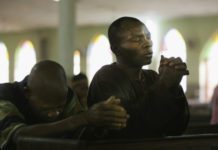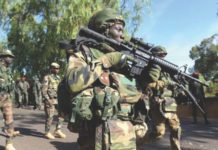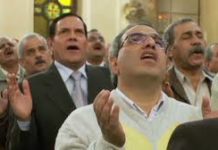By BosNewsLife Africa and Middle East Services
CAIRO, EGYPT (BosNewsLife)– There was concern Sunday, February 13, about the future of hostages held by human traffickers in Egypt’s Sinai Desert, including children, amid an uncertain security situation following the resignation of President Hosni Mubarak after unprecedented protests against his rule.
Christian rights investigators said an eleven-year-old Eritrean boy, known only as Abriel, is one of at least three minors among those detained for ransom by traffickers, who allegedly also tortured and even killed several hostages to step up the pressure.
“The boy is reported to be suffering from a broken arm, but is bound by chains on his hands and feet, along with 150 other refugees and asylum seekers who are powerless to help him as he cries out in pain,” said advocacy group Christian Solidarity Worldwide (CSW).
There are believed to be Christians among the trafficked refugees, who have been fleeing reported persecution in Eritrea. “Two other children, aged fourteen are reportedly being held in the same inhumane conditions in metal structures close to Egypt’s border with Israel,” CSW added.
MINORS ABDUCTED
While the three minors were reportedly abducted in Sudan, others in the group were tricked by Bedouin traffickers after paying for safe passage to Israel, according to CSW investigators in a statement.
“CSW condemns the mistreatment of the three minors and the denial of medical attention to an eleven-year-old child,” added the group’s CSW Advocacy Director Andrew Johnston told BosNewsLife.
His Britain-based organization said a hostage held for seven months and sold on to four different gangs of traffickers reported that the metal containers in which they are held are extremely hot during the day and very cold at night. “The group is also tortured regularly, with traffickers dripping melted plastic on their backs in order to elicit exorbitant ransom payments from their family and friends abroad.”
CSW stressed it had received reports in November of 250 Eritrean hostages held along with other nationals by traffickers near the town of Rafah. They were allegedly being “repeatedly beaten, branded like cattle, and deprived of food and water.”
ORGANS “HARVESTED”
Several men had been informed “their organs would be harvested in lieu of payment, while women were repeatedly raped by numerous assailants,” the advocacy group said. Around 140 of these hostages were freed, but eight people were killed and 100 were sold on “and can no longer be located,” CSW explained.
Other rights activists were reportedly able to make contact with a seperate group of 150 hostages held by a different gang. “Twenty five of these are now in Israel. However, one has disappeared, while a female hostage is still being held by her abductors.”
Altough many hostages were freed after traffickers received “some form” of payment, “there has been no effective action on the part of the Egyptian government to secure” the release of others remaining behind, CSW said.
“Attempts may have initially been hampered by the terms of the 1978 Camp David Accords, which stipulate that Egyptian border troops must be lightly armed, in a marked contrast to the heavily armed Bedouin. In January Israel agreed to an initial request for an increase in border troops in following the outbreak of unrest in Egypt, but is now reported to have refused a second request.”
INTERNATIONAL CONCERNS
Pope Benedict XVI, the European Parliament, and the United Nations refugee agency have also expressed concerns about the situation.
“The general deterioration of security in the Sinai, coupled with increasing reports that armed Bedouin are attacking the Egyptian security services, deepens our concern for the well-being of the remaining hostages,” Johnston said.
“Clearly, Egypt’s delay in tackling the issue of trafficking is now having unfortunate consequences on the country’s internal security in this sensitive region. We therefore urge the Egyptian authorities to ensure that the additional troops are mandated to combat every source of insecurity in the Sinai area, including bringing an end to this modern form of slavery and releasing its victims”.
Egyptian authorities denied wrongdoing, while President Mubarak was still in power. The country’s Foreign Minister Ahmed Aboul Gheit told reporters at the time that it has no information over the reports that there were hostages in the desert.
RELIGIOUS PERSECUTION
There are several reasons why refugees flee, including religious persecution in countries such as Eritrea, where thousands of Christians are held in prisons across the country, according to several human rights groups.
Most of them are believed to be evangelical Christians as Eritrea only recognizes four religious groups including Islam, the Eritrean Orthodox Church, the Roman Catholic Church and the Lutheran Evangelical Church of Eritrea. However, even members of recognized religions haven’t escaped persecution, according to church observers.
Eritrean Christians say the government of President Isaias Afwerki has stepped up its crackdown on churches it has outlawed in 2002. The government says “no groups or persons are persecuted in Eritrea for their beliefs or religion.”









That is horrible. Refuges are certainly being overlooked in the crisis. That must be really a traumatic ordeal for them.
I remember when I was in Malta, I got to meet a lot of the folks from Eritrea. They were real neat folks. The people from their evangelical church there were very bold in sharing Christ with all they met.